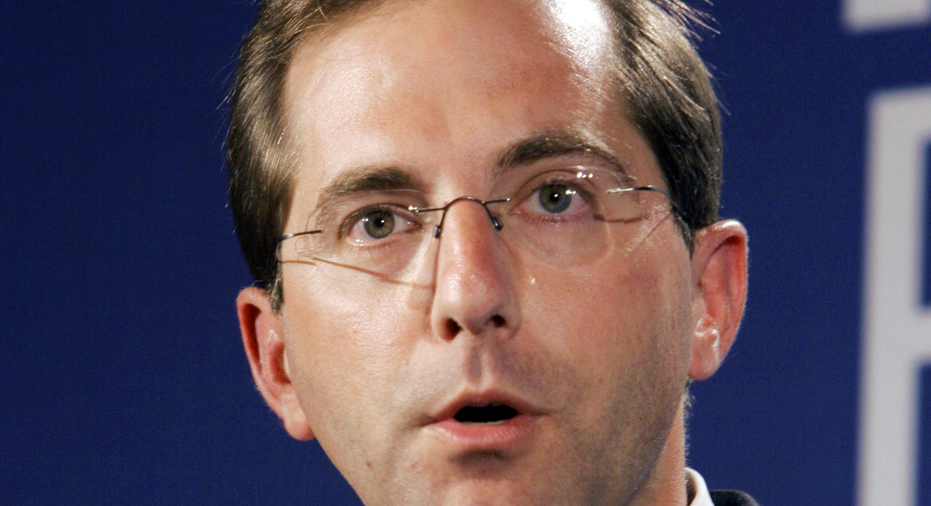In Trump health secretary pick, Dems have questions but hope

WASHINGTON – President Donald Trump's pick for health secretary is a former pharmaceutical company executive who already has drawn heat from Democrats over his ties to the pharmaceutical industry. But as Alex Azar faces his first nomination hearing, even some of those critics see signs he could shift the health care debate away from partisan confrontation.
"He's certainly given me the assurances that that's his intention," said former Senate Majority Leader Tom Daschle, a Democrat who met with Azar recently and has known him for years. "While there may be disagreements on policy, I do think he's willing to hear people out."
"He's the best choice we have, given the current political situation," said Kavita Patel, a health care expert with the Brookings Institution, who worked in President Barack Obama's administration and, before that, for Sen. Edward M. Kennedy, D-Mass.
All sides agree that Azar is headed for Senate confirmation, which would be his third after earlier appointments to senior positions at the Department of Health and Human Services. Nevertheless, he faces some tough questioning at his hearing Wednesday, given the Senate's hyperpartisan atmosphere, which has sunk or battered other nominees.
Sen. Patty Murray of Washington, the ranking Democrat on the Senate Health, Education, Labor and Pensions Committee, has tweeted her intent to ask Azar if he would be a toady for Trump's "extreme, politically driven & harmful agenda." Sen. Elizabeth Warren, D-Mass., said she has "concerns" about whether Azar would carry out Trump's promise to deliver "better health care and lower drug prices."
The Senate Finance Committee will hold its own hearing on Azar soon and decide whether to send the nomination to the full Senate.
If confirmed, Azar would be Trump's second HHS secretary, replacing Tom Price, who resigned under pressure after using private charter flights at taxpayer expense.
Azar's career could prove a challenge given Trump's vow to "drain the swamp" of Washington.
Atop the list of questions likely to face Azar, 50, is whether he would work to lower drug prices given his lucrative, decadelong stint as an executive with Indianapolis-based Eli Lilly and Co. On Azar's watch, Eli Lilly drew criticism from patient advocacy groups for price increases to one of its biggest products: insulin.
In speeches while at Eli Lilly, Azar questioned whether the government's regulatory machinery has kept up with the pace of scientific change, and he warned that price controls could stifle innovation.
"Will he carry pharma's water? I don't think so, based on my interactions with him," said former Senate Majority Leader Bill Frist, a Republican from Tennessee. Like Daschle, he is active in the Bipartisan Policy Center, a Washington think tank.
In the decade before resigning from Eli Lilly earlier this year, Azar built a financial portfolio now worth $9.5 million to $20.6 million, according to disclosure records filed with the Office of Government Ethics. He also was paid nearly $2 million in his final year at the company, received a $1.6 million severance and sold off more than $3.4 million in Eli Lilly stock. He also declared $100,000 to $1 million in capital gains from the sales, along with millions more in stock and bond holdings.
Before his pharmaceutical career, Azar was an Ivy League-educated lawyer with conservative credentials. He built connections in Republican circles — he clerked for Supreme Court Justice Antonin Scalia, worked under Kenneth Starr during the Whitewater probe of President Bill Clinton's land deals and raised campaign cash for GOP presidential candidates Mitt Romney and Jeb Bush.
His posts at HHS allowed him to build relationships with Democrats, too. Daschle said he worked most closely with Azar in 2001, when Daschle was a South Dakota senator and anthrax was found in his office. Azar was then the HHS general counsel. Four years later, he was confirmed as deputy secretary of the agency.
Back home in Indiana — home of Vice President Mike Pence — Azar also built a reputation as a pragmatist.
"In terms of raw brain power, he was well over and above the average board member by a long shot," said Kelly Flynn, a Democrat who served as a member of the Indianapolis Airport Authority board with Azar.
Dan Mendelson, president of the consulting firm Avalere and a Clinton administration veteran, said Azar's credibility comes from an understanding of federal programs and HHS divisions like Medicare, Medicaid and the Food and Drug Administration.
"He has policy wonk credentials," said Mendelson, a Democrat who has known Azar for about 20 years and considers him a friend. "I can't think of a better person to tackle the opioids crisis, for example, because he understands all the different levers."
___
Associated Press writers Tom Murphy and Brian Slodysko in Indianapolis and Stephen Braun in Washington contributed to this report.



















